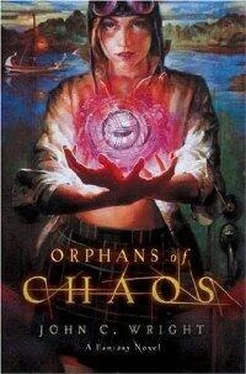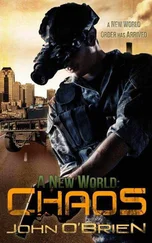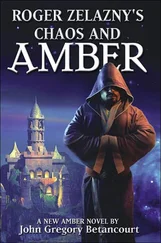It was actually Tertia who found the notes, some sheets of foolscap paper folded and refolded and crammed into a little crack where the wainscoting had become separated from the wall. We were both kneeling and scrubbing, and we exchanged a quick glance at each other. By the look in her eye, I knew she knew (as I did) that we had found a great treasure, which must be kept away from the grown-ups at all costs.
I pretended I had to go to the lavatory and made a fuss, while Vanity stole a fork from the silver drawer. Mrs. Wren, of course, did not let me go until chores were done. So we both diligently pretended to scrub the section of wainscoting where our treasure was, and Vanity would pluck at the papers with the tines of the fork when Mrs. Wren was idling near the liquor cabinet.
Like a fluttering pale moth, the papers came free with a rustle of noise, and I quickly stuffed them down my shirtfront. We were let out for recess and exercise, but I was too cunning to take them out where someone might see, so I quickly folded them into my uniform shirt when I was changing into my field hockey gear, and then ripped a button from the shirt. Sadly, I displayed the torn shirt to Mr. ap Cymru, who was coach then, and I got permission to go put it in the hamper in the East Hall for the maid to repair, and told to get a new blouse from the dormitory, so that I would have something to change into after practice.
Easy as pie. The notes were soon hidden in my room. I gazed at the handwriting, seeing the fine but strong feminine penmanship, and thinking how lovely it would be to have a hand as fine as that. Whoever wrote this (I remember thinking) would never have her knuckles rapped because her Q’s and O’s were lopsided. It was some sort of fairy tale, but one that made no sense, merely fragments; and I remember thinking that I was too old for fairy stories.
This will seem strange, and impossible to explain, but I did not recognize the stories, the handwriting, any of it. I wrapped the sheaf of paper in a plastic bag and took it to a hidden spot, a dry deep hole in the bark of a tree on the back campus, deep enough so that rain could not reach. And left it.
A year, perhaps two, went by before I was old enough not to be ashamed of my interest in children’s tales, and I thought to look at it again.
By that time, I had learned my penmanship. My cursive letters flowed in a fair, clean hand from my pen, far better than the crooked scrawl I had been using even a year before.
And here were these papers at least ten years old, or more. It was my handwriting.
You must have guessed what was on those papers. I read the tales we had told each other that night in the coal cellar. I had forgotten every single one of them, including my own. The paper trembled in my hands when I held it, and the tears blurred my vision.
I did not for a moment doubt the truth of them. Titans trapped in ice. Werewolves running through trees so tall their branches caught the stars. Magic dogs who sit by the door, and poets who sing tales of yore. A city in outer space, inhabited by creatures wiser than man, meant somehow to protect the world. A castle of light, where a throne sits on a magic glass where everything in every world can be seen.
One moment, it merely sounded familiar, like a dream you can half recall. The next moment I remembered the coal cellar, that night of terror. Victor had saved Quentin from freezing to death. He made a vow never to forget stories that were obviously already half-forgotten things, pages torn at random from lost diaries.
But I did not remember the events captured in the Tale. I remember telling the others about my mother and father, but I did not remember my mother and father. Nothing. Not a face, not a sound of voice, not the feel of a hand holding mine.
I told Victor what I had found. He was as tall as a man at that time, but it was before the hair appeared on his lip, so perhaps this was a year or so before the experiment when he tried to measure the moon, and prove Einstein’s theory false.
It shook him. I had never seen him actually so frightened before. He kept wiping his eyes, as if the fear was making him want to cry.
He said, “If they can erase our thoughts, if they can blot out our past, what chance do we have?”
I was more shaken by the fact that he was shaken than I was by the fact itself. “You believe it? All this stuff?”
He shook his head, but it was one of those head shakes where you don’t know if you mean yes or no. “I don’t see why not. It is no stranger than some of the things we learn in science. All this time, I was thinking we were from France, or maybe Asia, or, well, at least the planet Mars. Or…”
He took a deep breath, and calmed himself.
I said, “Let’s not tell the others.” I was thinking that if Victor, who was (in my mind) the paragon of self-control, was frightened by this, Quentin would go mad.
Victor said curtly, “We keep no secrets from each other.”
Vanity did not faint; she was delighted. “My mother has red hair!” I remember how she used to whisper that to herself as she was falling asleep in the dormitory bed next to me, as if it were her own form of prayer.
We did not have many chances to speak together without being overheard. But, from time to time, Colin would create an opportunity, such as by pulling the fire alarm.
I told him the story in hurried whispers as the alarm was ringing and ringing in the hall, and slipped him the papers quickly. He had some questions for me, so there were fire alarms the next day, and the next.
Colin acted as if he did not believe it. “They might have faked your handwriting. Put those notes up to fool us, ruin our morale,” he said. But I overheard him asking Quentin a few weeks later, “People don’t really die from grief, right? That’s just a saying, right…?”
Quentin’s reaction was the opposite, when he found out. He was not skeptical at all. I remember it was after he got the copy of the papers from Colin that he began, during our very rare trips into town, to ask the librarian, or the local fishermen, or the granny selling flowers on the street corner, about tales of Welsh witches, King Arthur, or the Great Gray Man of the Hill. He took in every little story he could find, and asked for extra homework, just to get the chance to spend more hours than normal in the library, leafing through Ovid’s Metamorphosis, or the Malleus Maleficarum .
By that time, Colin had bored a hole through the locker room wall into the girls’ shower, with an awl he stole from Mr. Glum, so we could have longer conversations in private, so he said.
Myself, I just got into the habit of squirting hairspray into any hole I saw in or near the shower. I never heard Victor’s voice suddenly cry out in pain from behind the wall, and Quentin’s only once.
But nearly a month passed while that whisper hole was in place, and no teacher really minded if you spent a long time in the shower. And we supposed the sound of the water might hide our voices.
That was the summer Victor formalized our rules, and put them to quick votes which we registered in whispers, or by a quick knock on the wall.
It was Quentin who insisted we all take once more the vow we had made, and forgotten, in the coal cellar. “Vows are powerful things,” he said. “They set things in motion.”
We could not all put our hands together through the tiny hole in the locker room, so Vanity and I held hands, while the boys (I assume) did their Three-Musketeers slogan.
And Quentin added one personal codicil to the group oath. “Whatever has been hidden in darkness, I will discover. I will learn the secret, I will find the key, I will dare to turn it; I will pass through the door. The sleeper slumbers; he shall awaken.”
Читать дальше











